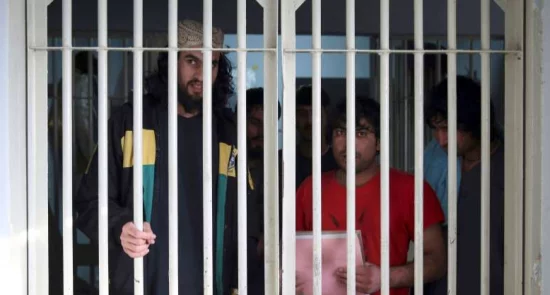Afghanistan April 8, 2020
Short Link:Taliban Violated The Peace Deal For What it Calls ‘Fruitless Talks’

The Taliban said the US peace deal on the breaking point, accusing Washington of violations that included drone attacks on civilians, also chastising the government for delaying the release of 5,000 prisoners.
Ariana News Agency-
The Taliban said they had restricted attacks against Afghan security forces to rural outposts, had not attacked international forces and had not attacked Afghan forces in cities or military installations.
The Taliban said these limits on their attacks had not been specifically laid out in the agreement with the US signed in February.
The Taliban’s statement warned of more violence if the US and the Afghan government continue alleged violations of the deal.
US military spokesman Colonel Sonny Leggett in a tweet overnight denied the Taliban allegation, saying the US forces in Afghanistan have “upheld and continues to uphold the military terms of the U.S.-TB (Taliban) agreement; any assertion otherwise is baseless”.
In his tweet, Col Leggett called for Taliban to reduce violence and said the US military will continue to come to the aid of Afghanistan’s security forces if attacked, in line with the agreement.
Meanwhile, the militants said they had reduced their attacks compared to last year, but said continued violations would “create an atmosphere of mistrust that will not only damage the agreements, but also force mujaheddin to a similar response and will increase the level of fighting”.
The Taliban have accused the Afghan government of using “indefensible arguments” to explain the repeated delays in releasing a promised 5,000 Taliban prisoners in exchange for 1,000 government personnel.
The Afghan government’s foot-dragging has also left Washington frustrated.
Meanwhile, in the Afghan capital, President Ashraf Ghani announced his new Cabinet even as he squabbles with his main political challenger over last year’s election results.
Mr Ghani’s move came even as Afghan mediators, including former president Hamid Karzai, shuttled between the president and his opponent, chief executive Abdullah Abdullah, who has also declared himself Afghanistan’s president.
The country’s independent election commission has declared Mr Ghani a winner, but Mr Abdullah and the Elections Complaint Commission have charged widespread irregularities.
Attempts to negotiate an end to the political turmoil in Kabul have made little progress, frustrating the US and potentially derailing the next stage in the Afghan peace process.
Washington has threatened to withhold one billion US dollars in aid this year if Mr Ghani and Mr Abdullah cannot reach a compromise.
The Trump administration wants a quick start to intra-Afghan negotiations, the next step in the peace deal it signed on February 29.
It looked promising when Mr Ghani announced his negotiating team last week, but Mr Abdullah’s response to it has been lukewarm and the Taliban have rejected it as one-sided.
The US and Nato have already begun to withdraw troops from Afghanistan.
The full withdrawal is expected to be completed in 14 months and is tied to Taliban commitments to fight terrorist groups and help in the battle against the Islamic State group.
The withdrawal is not tied to the success of intra-Afghan negotiations, but US secretary of state Mike Pompeo had travelled to Afghanistan last month to try to break the impasse between Mr Ghani and Mr Abdullah.
Mr Pompeo left without a solution; however, last week he welcomed that the Afghan government had put together a negotiating team and made progress toward the prisoner releases.
Those releases have stumbled even as the Taliban sent a three-member team to Kabul last week.









